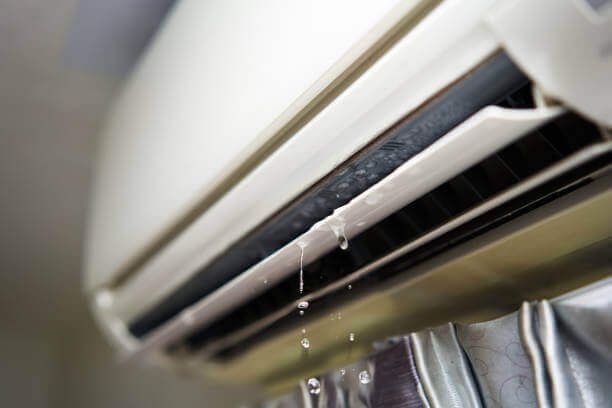
Why Air Conditioners Leak Water
Air conditioners are essential for maintaining a comfortable indoor environment, especially during hot and humid weather. However, like any mechanical system, they can develop issues over time. One of the most common problems homeowners encounter is water leakage. While this may seem like a minor inconvenience, a leaking air conditioner can be a sign of underlying issues that, if not addressed, could lead to more serious damage to the unit and even your home. Understanding the causes of these leaks is crucial in maintaining the efficiency and longevity of your air conditioner. In this guide, we’ll explore the most common reasons why air conditioners leak and how to prevent them from happening.
1. Clogged Drain Line
The primary job of your air conditioner is to remove heat and humidity from the air. The moisture (condensation) that’s removed from the air is supposed to drain out through the condensate drain line. However, over time, dirt, algae, mold, and other debris can accumulate in the drain line, forming a blockage. When the line gets clogged, the water has nowhere to go and starts to back up, causing leaks. In many cases, the backup occurs in the drain pan, causing water to overflow from the unit. Cleaning the drain line, either using a vacuum or a specialized cleaning solution, can often solve this problem.
2. Dirty Air Filter
The air filter in an air conditioning system is meant to trap dust and debris to keep the system clean. When this filter becomes clogged, it restricts airflow over the evaporator coil. As a result, the coil can’t absorb enough heat, causing it to freeze over. Once the system turns off and the coil thaws, the excess water from the melting ice may overwhelm the drainage system and cause a leak. A dirty air filter is one of the most common causes of air conditioner issues, so regularly replacing or cleaning the filter is essential for preventing such problems.
3. Damaged or Rusted Drain Pan
The drain pan is located beneath the evaporator coil and is designed to collect condensation as it drips off the coil. If the drain pan is old or has rusted, holes can form, allowing water to leak through instead of being funneled out through the drain line. Over time, especially in older units, the drain pan can corrode, crack, or become otherwise damaged, allowing water to seep out into the surrounding area.
4. Improper Installation or Unit Tilt
For window and portable air conditioners, proper installation is critical. The unit needs to be slightly tilted toward the outside so that the water can flow out through the back of the system. If it’s not installed with the right tilt, or if it’s sitting at an improper angle, the water may not drain properly. Instead of flowing outside, the water can accumulate inside and cause a leak. Ensuring the unit is level or slightly sloped in the correct direction is essential to preventing drainage issues.
5. Low Refrigerant Levels
Refrigerant is the substance that cools the air in an air conditioning system. If the refrigerant levels are too low, the system will struggle to absorb heat, causing the evaporator coil to freeze. When the system cycles off or the ice begins to melt, the resulting excess water may exceed the drain pan’s capacity or overwhelm the drainage system, leading to leaks. Low refrigerant levels usually indicate a leak in the refrigerant lines, which will need to be repaired by a professional.
6. Blocked or Faulty Condensate Pump
In some air conditioning systems, especially larger ones or systems installed in basements, a condensate pump is used to remove the water that builds up from condensation. If this pump malfunctions or becomes clogged, the water will not be pumped out of the system, leading to a backup and leakage. A faulty or blocked pump needs to be cleaned, repaired, or replaced to ensure proper drainage.
7. Excessive Humidity
When the air is very humid, the air conditioning system may produce more condensation than usual. In extreme humidity, the water removed from the air may overwhelm the drainage system, causing occasional leaks. This is usually a temporary issue, but it can be mitigated by checking that the system’s components (such as the drain pan and line) are clear and capable of handling the increased volume of water. In particularly humid environments, a dehumidifier might also be needed to reduce the load on the air conditioning unit.
Other Potential Causes
- Frozen Evaporator Coil: A frozen evaporator coil can cause water leaks when it defrosts. This can happen for reasons like dirty air filters, insufficient refrigerant, or blocked airflow. As the ice melts, the drainage system may not be able to handle the volume of water, leading to leaks.
- Faulty Installation: If an air conditioner has been installed incorrectly, particularly window units, leaks may occur due to poor drainage or airflow. Proper installation techniques can prevent this.
Preventative Measures
To prevent air conditioner leaks, regular maintenance is crucial. Here are some tips to keep your AC in good working condition:
- Clean or Replace the Air Filter: Do this every 1-3 months, depending on usage.
- Inspect the Drain Line: Check it regularly for clogs and clear it using a vacuum or cleaning solution.
- Check the Drain Pan: Look for rust or cracks, especially if your AC is older.
- Professional Service: Get your system inspected and serviced annually by a professional to check refrigerant levels, coils, and other components.
A well-maintained air conditioning system is less likely to experience leakage and other related problems.
Check out blog posts below!
Latest Posts
Subscribe To My Newsletter
Get updates on the latest posts and more from our Blog straight to your inbox.
Contact

info@dangpham.com
Follow Us:
